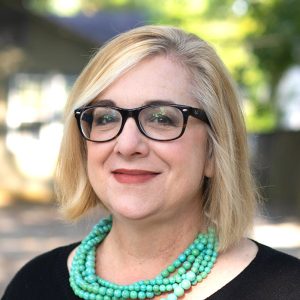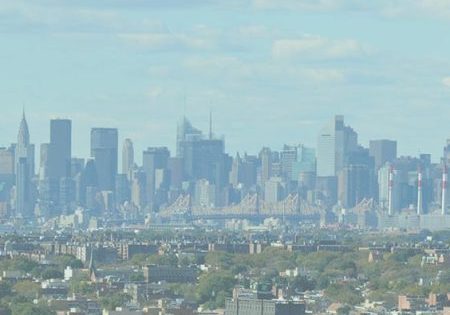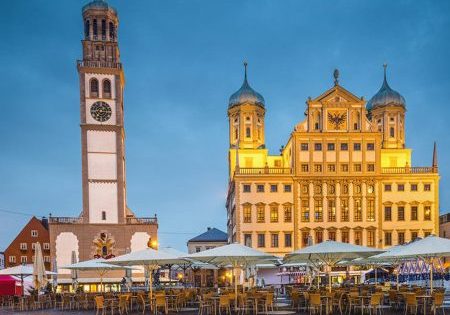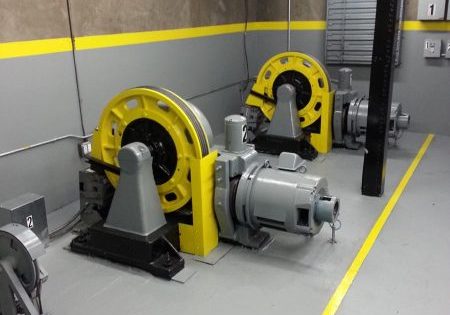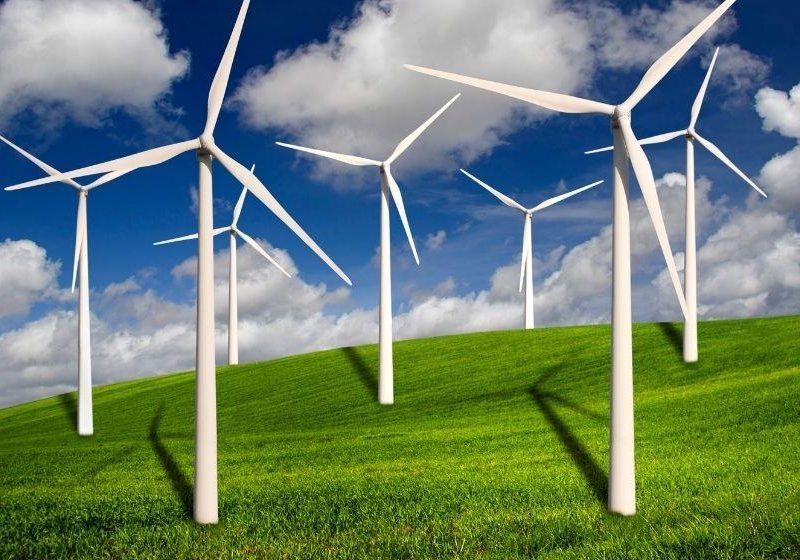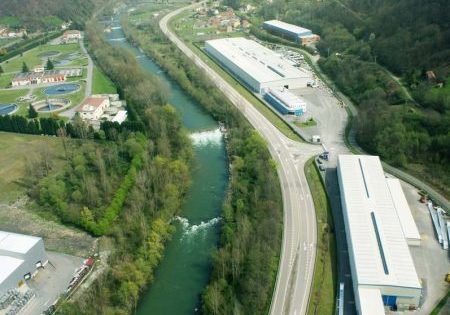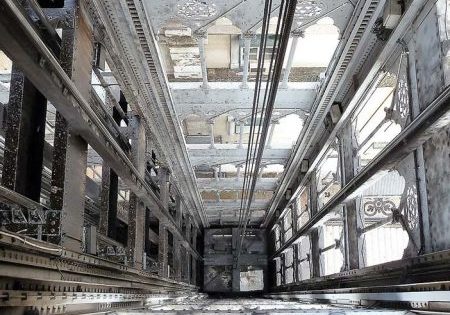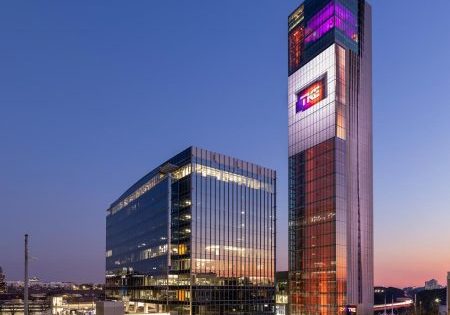Time for Excitement
Apr 1, 2022
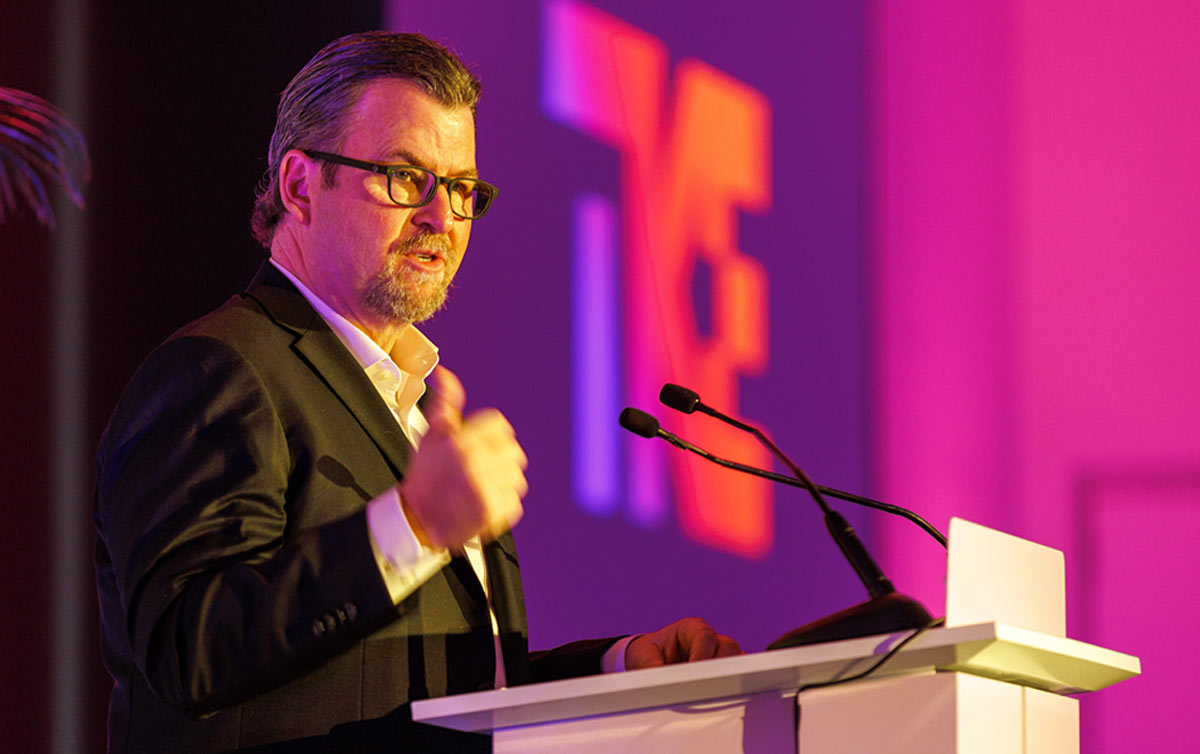
A conversation with TKE North America CEO Kevin Lavallee about urbanization, company plans and how the new HQ in Atlanta fits into the equation
TK Elevator North America CEO Kevin Lavallee has been in the elevator game a long time. A native of Ontario, Canada, Lavallee grew up working at his father’s side, learning to troubleshoot elevators when he was just a kid earning CAD2 per service call. His first employer, Northern Elevator, was the first company acquired by what was then Thyssen, and Lavallee rose through the ranks there, eventually to Canada CEO. He remembers overseeing field work in the late 1980s and getting a giant brick cell phone in a bag so he could communicate with the main office. “It was like, CAD3,000 a month, and then we realized I didn’t know anybody with a cell phone so I couldn’t call anybody,” he says with a laugh. He was, however, able to call the office when needed, but those calls were expensive. Today, things are much different: Not only Lavallee, but his children, have cell phones that are much smaller, much less expensive and far more capable. “Life and elevator business has changed so fast, especially in the last 10 years,” Lavallee says. Those changes include TK Elevator’s (TKE) new high-tech North American headquarters (HQ) in Atlanta, which include the tallest elevator test tower in North America and a wealth of expansive, comfortable meeting rooms (Game Changer). For his part, Lavallee remembers celebrating company milestones in a small office surrounded by stacks of paper, “before computer storage was even common.” Back then, he remembers, Thyssen had only 800 elevators under maintenance. Today, TKE is a powerhouse that was sold a few years ago for US$18.7 billion (ELEVATOR WORLD, April 2020) with a maintenance portfolio in the millions. In today’s world, Lavallee is exceptional in that he rose from an elevator technician to CEO. “He is a rarity in this industry, and that’s a shame,” says TKE Public Relations Manager Dennis Van Milligen. “He is someone who genuinely cares about everyone within this organization and respects all levels, because he’s been there.” Lavallee (KL) took the time to speak with your author (KW) prior to the grand opening of the HQ in Atlanta, where Lavallee and his family now also make their home.
We’ve made significant headway [in the Asia Pacific] over the past five or seven years in terms of market share, but we were less exposed to [the Chinese property market situation] than our competitors.
KW: Remind me how many hats you wear now.
KL: I am the CEO for North America and the chief operating officer for the field globally. I am also on the management board of TKE globally.
KW: TKE made five acquisitions in North American in 2021 and a couple the year prior. What is the acquisition plan going forward?
KL: I don’t think of acquisitions as, “We want to have this much in sales or have this many elevators.” I look at it as, “What do our customers need?” Some of our customers might be in a location where we see a good elevator company that would add to our ability to provide service, which is the heart of our business. For me, that’s really how acquisitions work. There are areas and companies out there that we continue to look at in North America.
KW: Geographically, where are these prime candidates?
KL: They are really all over North America. We are pretty strong in North America, with 160 physical locations and good managers, good technicians and good sales forces. So, geographically, there are really no restrictions. The ones that are a little closer to happening, I have to keep a little closer to the vest because we have to respect their existing workforces.
KW: The 29th TKE Canadian branch location opened in 2021. Are any additional locations planned either in Canada or elsewhere?
KL:Toronto South was our fourth location around the Greater Toronto area. Geographically, some cities are a lot larger, and Toronto is certainly one of them in North America that needs additional locations. It makes a lot of sense to invest in our people and our customers with brick-and-mortar locations. We need to be where our customers are, and not just virtually. So that’s why we did it, and we have a few more planned in North America over the next year. I look forward to that. I can’t reveal where, because we like to let our employees and their employees know first. We like to be 100% committed, and we like to be transparent with both employees and customers in those situations.
KW: How important will digital be to TKE’s strategy going forward?
KL: It’s a game changer — not just for TKE, but for the industry. It’s going to drive urbanization around the globe. People in North America maybe live out in the suburbs more than those in Europe or the Asia Pacific, but urbanization is definitely happening in North America, too. What we foresee by 2050 is that 70% of the population is going to be concentrated in city centers. And the only way you can really do that is with technology to make sure elevators are running at 100% of their scheduled uptime. You do that through solutions like we have with MAX and AGILE, which we brought to the market early. North America, specifically, has the most MAX-connected units out of our industry, and we just see it as a game changer going forward for our customers and in terms of safety.
KW: I hear a lot of talk in OEM earnings reports about the Chinese property market liquidity situation being a problem. What are the main challenges being faced by TKE globally in 2022 and are they surmountable?
KL: It’s interesting that you bring up the Asia Pacific, because that’s one of the markets where we weren’t a leader in terms of footprint and new installations. We’ve made significant headway there over the past five or seven years in terms of market share, but we were less exposed to that than our competitors. That’s good and bad. We still have a ways to go with our new products there, but are optimistic about things like our new machine-room-less offerings.
In the Asia Pacific, we didn’t have as much exposure financially, which is good news in terms of our other customers because we’re not trying to take from one geographical region to help another. So, overall, I think we’re well-positioned. We’re also well-positioned from the modernization standpoint over the rest of the industry because we were a collection of smaller companies that grew into this large company — in North America and in the rest of the world. So we’re very strong in the modernization market. When we talk about urbanization, a lot of buildings are already built, and they are going to require modernization. That’s a skillset we are well-versed in. We’re pretty excited about where we are going for the next five-10 years.
KW: What’s the latest on MULTI? Can we expect to see it in North America anytime soon?
KL: Our new Innovation & Qualification Center is equipped to put in a MULTI installation. We have TWIN there now. MULTI, of course, is different technology in terms of no cables and elevators running horizontally and vertically. In Europe, we’re anticipating 2023 codes will allow MULTI. Of course, North America will be right behind Europe in terms of code requirements. Code committees that we sit on are working toward that. Within the next five years, I think you will see something in North America.
KW: The last time we spoke, you mentioned a trip around the world on your Harley-Davison motorcycle as one of your personal goals. Has the pandemic affected that?
KL: Pretty much everything has been affected by it. The hospitality industry was probably hit the hardest at the beginning of COVID-19 in North America. Canada was basically shut down, and pockets of the hospitality industry in the U.S. had more stringent restrictions than others. Europe was no different. In the Asia Pacific, you couldn’t get into some countries without quarantining for three weeks. Australia [was very recently] still on lockdown. So, to answer your question, yes, it did. But that goal is going to require me to probably spend a little less time in the elevator business, so it will be when I retire. Whether that will be in five or 10 years, I’m not sure.
KW: How are you and your family settling into Atlanta?
KL: I think when you and I talked earlier, I told you how much we love the state of Georgia and Atlanta, specifically, for lots of reasons. It’s a really vibrant city. We have one of the busiest airports in the world here and will be bringing in customers all the time. It’s astounding how many head offices have relocated to Atlanta in the past 10 years. So it’s a pretty exciting time to be here from a business point of view. From a personal point of view, the relationships that we’ve made in just the three short years we’ve been here have been incredible. It’s harder the older you get to really make ties in the community, but my wife and I have. We’ve decided we are going to retire here. It’s a fantastic place. We’re really happy that this is where we decided to put our HQ.
KW: What, personally, has being so heavily involved in the HQ meant to you?
KL: It’s the excitement I see from our employees, our customers and our associates. I mean, what an opportunity! Publicity from publications like yours get old elevator guys like me excited about the elevator business. Now, the way technology is going with engineering and R&D, and the STEM (science, technology, engineering and mathematics) community that’s seeing whole new careers open up for them, more people are excited to be a part of it. It’s not just the elevator technicians of the world — that’s where I came from — but, really, everybody. We had one of your colleagues from the media here today who asked, “Why should I be excited as a newsperson about the elevator industry?” I said, “Think about urbanization. If 70% of the population is going to be in the city core, you obviously need elevators because there is a limited footprint on which to build. And we have to build smartly. You’re probably going to have to have your work, home and entertainment in a single place, and you’re going to be dependent on elevators. They are going to play a big part in your life. You might not know it, but believe me, it’s going to affect you and it’s got to be done right.”
So I think that’s the exciting part — that there are so many different parts of the world that are going to be affected by urbanization. Think about the automotive industry. If 70% of people are living in downtown cores, you probably don’t need as many cars. Most cars will probably be electric because you don’t need them to go as far for as long. There will need to be better transit systems, and we play a part in all that — not only elevators, but escalators, moving walks and boarding bridges at the airports where people are moving into these cities. So for me, that’s the excitement. It’s not asking what the elevator business is. People have seen what it is and what it does, and that’s great for my family and your family. It’s going to cause people to say, “Hey, I know that business and I want to be part of it.”
There will need to be better transit systems, and we play a part in all that — not only elevators, but escalators, moving walks and boarding bridges at the airports where people are moving into these cities.
Get more of Elevator World. Sign up for our free e-newsletter.
